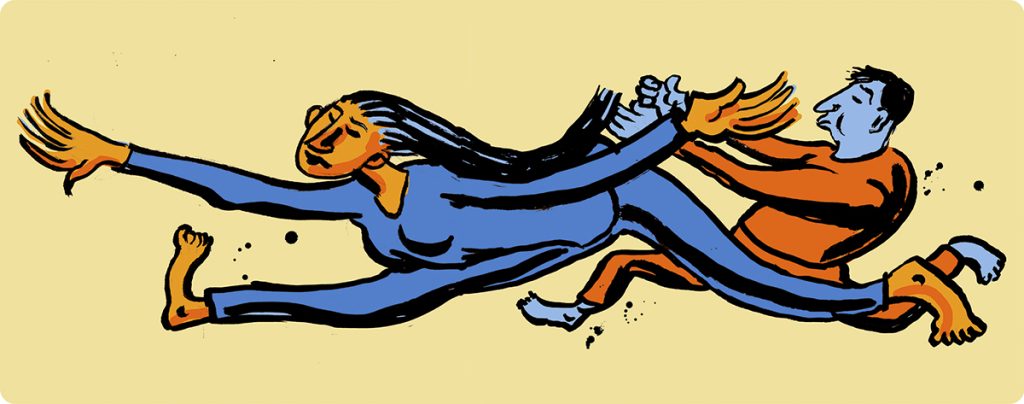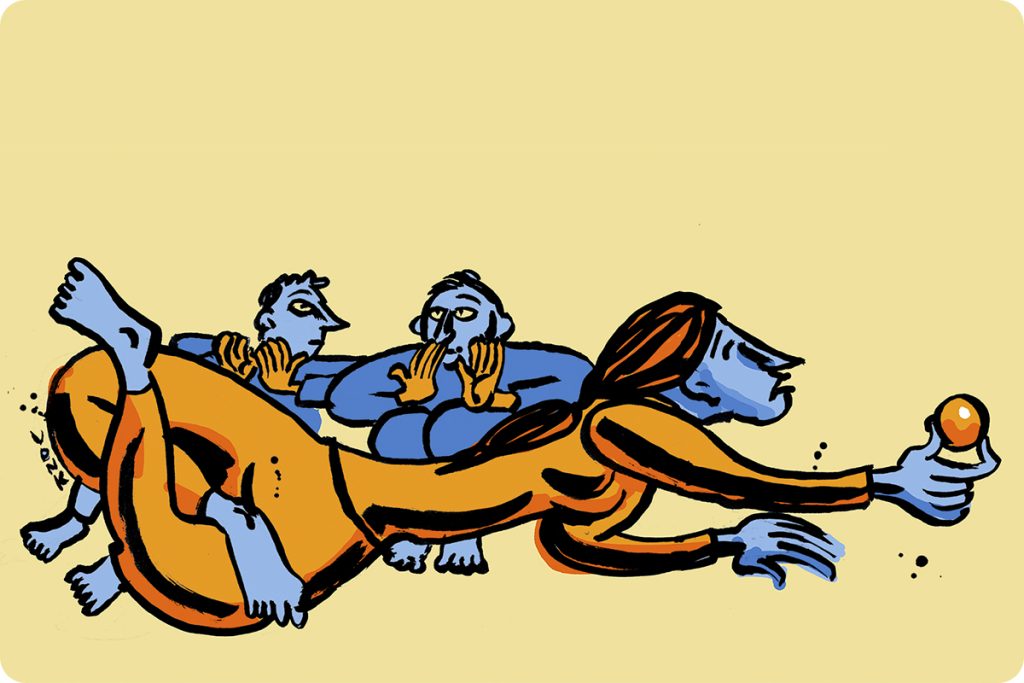In a lecture hall in the New University Building, three VU Amsterdam lecturers are somewhat nervously shuffling around in their chairs. Theatre teacher Jurriaan Kamp has just told them that some of the exercises in the next three weeks will be out of their comfort zones. He’s used to theatre students, who think “nothing’s too crazy”. “I’m scared already”, someone says.
And the same goes for me, because although when I entered the room I announced I’d be a fly on the wall for the report on this course, Kamp prefers it if I participate like everyone else. As a result, a little while later I’m introducing myself to my pretend students, after which they tell me what impression I made on them: “friendly”, “a little mischievous”, and then a bit questioning: “confident, or seeming confident.”
Playing the audience
It’s a first introductory exercise, perhaps to immediately lay bare what the lecturers can work on. Criminology lecturer Frank van Gemert, for instance, is told that he looks relaxed and in control, but that all of that does slightly come across as a trick. He has done it so often that he has become too comfortable, we speculate. Kamp: “Your audience doesn’t want to get the feeling it’s being played.”
So Van Gemert has to go again, to “give it a bit more flow”. He does so and it works, but at the same time it doesn’t. This new method of execution seems to make him aware of his presentation, and a little nervous as a result. Fortunately, his first method isn’t bad. Because, Kamp asserts, it’s not a problem at all if students are aware you’re doing something you’re hoping will have a positive effect on them. “Actually it’s a compliment, showing you care what impression you make on them.”
Theatre skills for lecturers
The theatre skills course is organised by the Centre for Teaching and Learning. The next series starts on 5 March and takes place every Tuesday from 1.30 to 5 PM for three weeks. You can register on the VU Amsterdam website.
Importance of intent
Economics lecturer Evgenia comes across as a bit unsteady when she announces her lesson, which Kamp takes advantage of to talk about the importance of intent. “If you yourself are convinced that what you’re going to say truly is interesting, you transmit that enthusiasm to others. And if you’re teaching a class at four o’ clock and you’re thinking: I’d rather go home, your students will feel this and will start thinking the same.”
‘I don’t believe you, I don’t feel like you really want to know’
Health sciences lecturer Jip Gudden is a bit too quick to break eye contact – making eye contact is part of the assignment – the audience thinks, although they don’t really know what’s the correct amount of eye contact. Further on in the course, that’s exactly what we practice.
Imaginary horse convention
Because, on the second course day, we’ll use our bodies – which Kamp consistently refers to as our instruments – to see how not only intent, but also our body postures and voices influence how we come across to other people. In pairs – one being the salesperson and the other the customer – we have to make clear what we want using just one word. Which leads to one person, who can only use the word ‘pen’, ordering half a loaf of unsliced bread, while someone else comes away from a suit shop with a pair of trousers by repeating the word ‘table’. “This is kind of what it feels like on holiday”, someone remarks.
We then proceed to walk around the room, which has now become an imaginary convention for horse lovers, and talk to the people we run into. Each one of us has been given an assignment beforehand: plant your feet on the ground and make your body broad or, conversely, make yourself smaller and touch your face a lot while you’re talking. Make eye contact all the time, or break it every two seconds. Use a deep voice or a high-pitched one, talk slowly or quickly.
Two lecturers who’ve both been told to try and appear bigger start to loudly argue about which saddle is the best choice. Another one, who is to avoid eye contact, threatens to be snowed under when he says his mother dropped him off and he’s a bit anxious about the whole thing. Our posture clearly affects our made-up stories. But also our interaction. “It’s impossible not to adjust to the person you’re talking to”, Gudden remarks. “That’s what makes you empathetic”, says Kamp.

Making mistakes
As the course series progresses, the participants start to be less giggly. On the first day, a warm-up exercise where we have to pass around a ‘handclap’ in a circle through eye contact causes some discomfort. But a week later, when we’re in the same circle passing around a movement with a sound effect to match, the group is unanimously determined to do so according to the pre-agreed pattern. When someone makes a mistake, they step into the circle to take a bow and receive an applause from the rest of the group, because as Kamp says: making mistakes is part of the deal.
‘That seduction felt forced, you first need to convince yourself’
Sometimes it’s still obvious the lecturers don’t have a background in performing. While Kamp passes a pair, he yells out: “Yes! Great! The theatre lover in me wants you to continue now, try not to switch to problem solving right away.” “As a scientist that’s very difficult”, laughs Evgenia.
In between exercises the participants still seem engrossed in the theatre lessons. There’s even a bit of improv in the break. “What a strange picture”, someone remarks about the photo on the wall of a Russian politician sitting at her desk. “Oh, but the village she lives in is actually gorgeous”, another makes up in response. The rest chuckle over their coffees.
Selling oranges
In the final class, we continue to work on our powers of persuasion by selling each other oranges or guns, and trying to get each other to stand up from a chair. First we use intimidation, then seduction, then we beg. And so we’re hanging on each other’s chair legs, shouting, faking tears and seductively whispering in ears. In this third class, timidity has become more and more of a foreign concept. Even when someone gets harsh feedback (“That seduction felt forced, you first need to convince yourself”), they take it on the chin and their next attempt is as daring as it is vulnerable.
No acting
The course culminates in the lecturers presenting a class. While Gudden is starting his PowerPoint, the rest wait in the hallway, because as Kamp says: the class already starts there, before the students have entered. When we walk in, as first-years coming for an introductory class, Gudden says: “Hi, come on in. How’s your first day?” “Ah, I don’t believe you, don’t feel like you really want to know”, says Kamp. “Again! Back to the hallway!”
Kamp’s tip – perhaps a bit unexpected after a theatre skills course: “You shouldn’t act, but believe what you’re doing.” Van Gemert: “I now realise that as lecturers, we’re inclined to think: this is what I want to get through in five classes. This means we’re way more focused on the contents than on the way in which you get a message across.”
